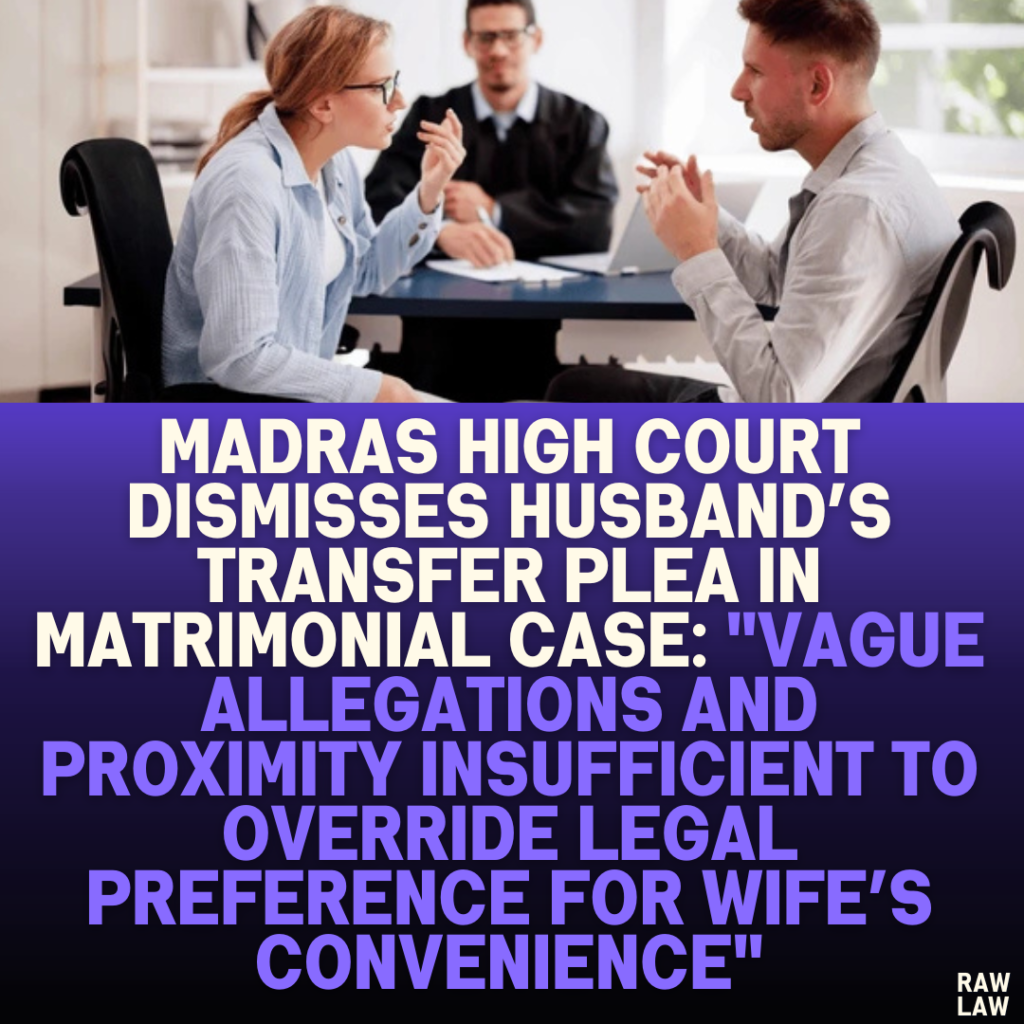Court’s Decision:
The Madras High Court dismissed the husband’s petition seeking to transfer a case under the Domestic Violence Act filed by his wife from the Additional Mahila Court in Pudukkottai to a court in Thanjavur. The court emphasized that in matrimonial disputes, “the convenience of the wife should be predominantly looked into” and ruled that the husband’s grounds for transfer were insufficient.
Facts:
The petitioner (husband) and the first respondent (wife) were married in 2007 and have two children. Following marital discord, they began living separately. The wife subsequently filed a petition under the Domestic Violence Act, seeking maintenance and other reliefs. The Additional Mahila Court in Pudukkottai directed the husband to pay a monthly maintenance of ₹7,000, which he has not yet paid.
Issues:
The main issue was whether the petitioner could justify transferring the case to a different court based on his apprehensions about the proceedings in Pudukkottai, considering his wife’s convenience as a crucial factor.
Petitioner’s Arguments:
The petitioner argued that the wife and her brother are advocates, which could create a hindrance for him in the Pudukkottai court. He further stated that he had to leave his job due to alleged harassment by his wife and is now unemployed, claiming that these factors justify the transfer request.
Respondent’s Arguments:
The counsel for the wife opposed the transfer, stating that the petitioner had not fulfilled the court’s maintenance order and was merely attempting to delay proceedings. They also highlighted that although the wife is an advocate, she is not actively practicing, negating the petitioner’s apprehension of unfairness.
Analysis of the Law:
The court examined the established legal principle that, in matrimonial cases, the wife’s convenience should take precedence, especially when a transfer petition is filed. The court cited prior case law, reinforcing that vague apprehensions from the petitioner do not outweigh the standard legal preference for the wife’s convenience.
Precedent Analysis:
The court referenced settled jurisprudence that in matrimonial disputes, transfer petitions should favor the wife’s convenience, particularly when the distance between the two locations does not pose significant hardship.
Court’s Reasoning:
The court observed that the petitioner had not provided sufficient evidence to support his apprehension of unfairness due to his wife and her brother being advocates. Furthermore, it was noted that his residence is not significantly distant from Pudukkottai, diminishing his argument for inconvenience.
Conclusion:
The court concluded that the husband’s grounds for transfer were based on vague allegations and that the legal preference for the wife’s convenience in such cases should be upheld. Accordingly, the transfer petition was dismissed, and the court closed the connected miscellaneous petition.
Implications:
This judgment reinforces the principle that in matrimonial disputes, the convenience of the wife is paramount in deciding transfer petitions. It further indicates that generalized apprehensions or unfounded allegations by the husband are insufficient grounds for such transfers.




Pingback: Supreme Court Restores Trial Court’s Decree for Specific Performance in Disputed Sale Agreement, Affirms Appellants' Possession and Rights Under Lis Pendens Despite Heirs’ Unauthorized Alienation of Property; Sets Aside High Court’s Findings on